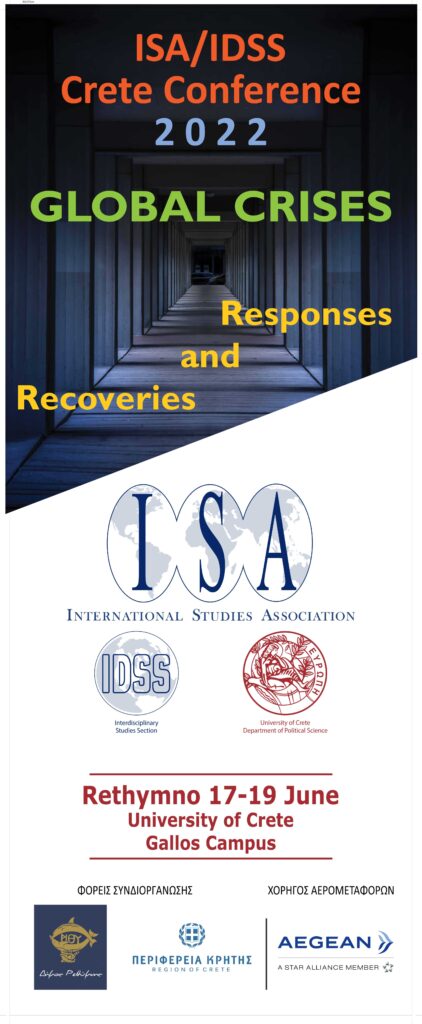
The Interdisciplinary Studies Section (IDSS) of ISA in collaboration with the Political Science Department, University of Crete will host an international conference in Rethymno, Crete, from June 17 to June 19, 2022.
The theme of the conference is: Global Crises: Responses and Recoveries
The current world faces overlapping crises that are global in scope from the Covid-19 pandemic, to expansive and multiple refugee movements, to intensifying poverty throughout the world, to global warming and consequent threats to ways of life and erosions of the landscapes around the world. New forms of power and domination are often manifest and made possible in each of these problematic arenas. Often, as well, these involve technical and scientific solutions that are difficult to reconcile with democratic values and institutions. This has encouraged authoritarian political movements as well as enhanced novel efforts at cooperation, interstate and in civil society.
This conference will provide an interdisciplinary forum for scholars, government officials, representatives of intergovernmental and non¬governmental organizations, and civic leaders to critically discuss some of the theoretical and practical challenges posed by global crises (as well as the contestability of the concept of ‘crisis’) and explore the prospects for sustainable policy responses consistent with international norms and standards. It is the expectation of the organizers that the conference will result in publications (books and/or special issues of scholarly journals).
The aim of this conference is to generate conversations that bring interdisciplinary perspectives to bear on theoretical, social, institutional, cultural and human aspects of responses to and recoveries from contemporary crises. The organizers therefore invite proposals employing various conceptual and methodological approaches. All types of submissions (individual papers, panel proposals, and roundtables) are welcome. Panel and roundtable proposals must include at least four papers, a chair and a discussant (the chair may also serve either as a paper presenter or as a discussant). Proposals may address a broad range of issues including, but not limited, to:
- Regional and local experiences refracted through their particular histories, practices, values, institutions or structures.
- Comparative studies of responses to current crises.
- The ways crises affect the lived experiences and everyday life-worlds of people situated in different locations and positions around the world. We therefore welcome papers on cultural, ethnographic, and literary (novels, theater, poetry, etc.) responses to current crises.
- Genealogical and historical studies of the emergence of ways of thinking about crises and particular crises that bear on dominant and alternative responses.
- Ethical responses to global crises in general, or to a particular crisis.
- Affective dimensions of recovering from current crises (for example, the role of mourning).
- How current crises are likely to change societies, peoples, regions, and the global as they learn to live with and recover from current crises.
- Historical studies of past responses to crises in so far as they are relevant to current dilemmas.
- Theoretical interrogations of responses to crises, including the effects on the concepts of sovereignty, security, legitimacy and justice.
- How crisis is identified, constructed or invoked for political or socio-economic purposes.
- Possibilities for recoveries involving alternative post-capitalist economies.
- The role of religion in responses to global crises.
- How neoliberalism has generated and affected responses to current crises.
- Papers and panels that relate current crises to structural transformations in the global economy.
- Critical studies of how current crises manifest and are likely to affect larger forms and structures and systems of power and authority.
- The likelihood that current crises will further the occurrence and transformation of war.

